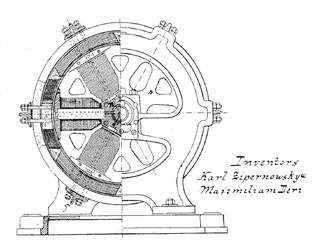Related Research Articles

A commutator is a rotary electrical switch in certain types of electric motors and electrical generators that periodically reverses the current direction between the rotor and the external circuit. It consists of a cylinder composed of multiple metal contact segments on the rotating armature of the machine. Two or more electrical contacts called "brushes" made of a soft conductive material like carbon press against the commutator, making sliding contact with successive segments of the commutator as it rotates. The windings on the armature are connected to the commutator segments.

A diesel locomotive is a type of railway locomotive in which the power source is a diesel engine. Several types of diesel locomotives have been developed, differing mainly in the means by which mechanical power is conveyed to the driving wheels. The most common are diesel-electric locomotives and diesel-hydraulic.
Brush Traction was a manufacturer and maintainer of railway locomotives in Loughborough, England whose operations have now been merged into the Wabtec company's Doncaster UK operations.

A traction motor is an electric motor used for propulsion of a vehicle, such as locomotives, electric or hydrogen vehicles, or electric multiple unit trains.

Bruce Peebles & Co. Ltd. was an Edinburgh industrial electrical engineering company.

The Ganz Machinery Works Holding is a Hungarian holding company. Its products are related to rail transport, power generation, and water supply, among other industries.
Metropolitan-Vickers, Metrovick, or Metrovicks, was a British heavy electrical engineering company of the early-to-mid 20th century formerly known as British Westinghouse. Highly diversified, it was particularly well known for its industrial electrical equipment such as generators, steam turbines, switchgear, transformers, electronics and railway traction equipment. Metrovick holds a place in history as the builders of the first commercial transistor computer, the Metrovick 950, and the first British axial-flow jet engine, the Metropolitan-Vickers F.2. Its factory in Trafford Park, Manchester, was for most of the 20th century one of the biggest and most important heavy engineering facilities in Britain and the world.

Electroputere S.A. is a Romanian company based in Craiova. Founded in 1949, it is one of the largest industrial companies in Romania. Electroputere has produced more than 2,400 diesel locomotives, and 1,050 electric locomotives for the Romanian, Bulgarian, Chinese, and Polish railways, additionally producing other urban vehicles and complex equipment.

In electrical engineering, the armature is the winding of an electric machine which carries alternating current. The armature windings conduct AC even on DC machines, due to the commutator action or due to electronic commutation, as in brushless DC motors. The armature can be on either the rotor or the stator, depending on the type of electric machine.
A brush is a device with bristles, wire or other filaments used for cleaning, grooming, painting, etc.

A brush or carbon brush is an electrical contact, often made from specially prepared carbon, which conducts current between stationary and rotating parts of an electrical machine. Typical applications include electric motors, alternators and electric generators. The lifespan of a carbon brush depends on how much the motor is used, and how much power is put through the motor.

FKI is a British engineering and manufacturing company headquartered in Loughborough, Leicestershire. For many years listed on the London Stock Exchange and a constituent of the FTSE 250 Index, it was taken private by buyout firm Melrose in July 2008.

Brown, Boveri & Cie. was a Swiss group of electrical engineering companies. It was founded in Baden bei Zürich, in 1891 by Charles Eugene Lancelot Brown and Walter Boveri who worked at the Maschinenfabrik Oerlikon. In 1970 BBC took over the Maschinenfabrik Oerlikon and in 1988 it merged with ASEA to form ABB.

Brush Electrical Machines is a manufacturer of electrical generators typically for gas turbine and steam turbine driven applications. The main office is based at Loughborough in Leicestershire, UK.
BRUSH SEM is a manufacturer of large generators for gas turbine and steam turbine drive applications, based at Plzeň in the Czech Republic.
Brush Turbogenerators owned by Melrose Industries, is a group of international manufacturing companies under the BRUSH brand. It consists of Brush Electrical Machines Limited based in Loughborough, UK, Brush HMA based in Ridderkerk, The Netherlands and Brush SEM based in Plzeň in the Czech Republic. BRUSH Turbogenerators manufacture large generators for gas turbine and steam turbine drive applications. The company was founded by Charles Francis Brush, who was born in Cleveland, Ohio, USA in 1849 and who had invented his first electric dynamo in 1876. Melrose Industries completed the acquisition with FKI in 2008.

A dynamo is an electrical generator that creates direct current using a commutator. Dynamos were the first electrical generators capable of delivering power for industry, and the foundation upon which many other later electric-power conversion devices were based, including the electric motor, the alternating-current alternator, and the rotary converter.
A metadyne is a direct current electrical machine with two pairs of brushes. It can be used as an amplifier or rotary transformer. It is similar to a third brush dynamo but has additional regulator or "variator" windings. It is also similar to an amplidyne except that the latter has a compensating winding which fully counteracts the effect of the flux produced by the load current. The technical description is "a cross-field direct current machine designed to utilize armature reaction". A metadyne can convert a constant-voltage input into a constant-current, variable-voltage output.

Brush Transformers is a company based in Loughborough, Leicestershire. They are a manufacturer of power transformers with a history stretching back over 120 years.
GEC Traction Limited was a British industrial company formed in 1972 which designed and manufactured electric traction equipment for railway rolling stock. The company had manufacturing sites at Manchester, Preston and Sheffield and was a wholly owned subsidiary of General Electric Company.
References
- ↑ Rudo Hermsen. "Biography of Willem Benjamin Smit (1860-1950)" (in Dutch). Willem Smith Foundation History - Nijmegen.
- ↑ Rudo Hermsen; Willy Ahlers. "Smit Slikkerveer | The history of Smit Slikkerveer (1882 - present)" (in Dutch). Willem Smith Foundation History - Nijmegen.
- ↑ Rudo Hermsen. "The History of Heemaf - Hofstede Crull era (1894-1919)" (in Dutch). Holec Historical Society.
- ↑ Willy Ahlers. "The History of Holec" (in Dutch). Holec Historical Society.
- ↑ Willy Ahlers. "Begemann (1989-1995)" (in Dutch). Holec Historical Society.